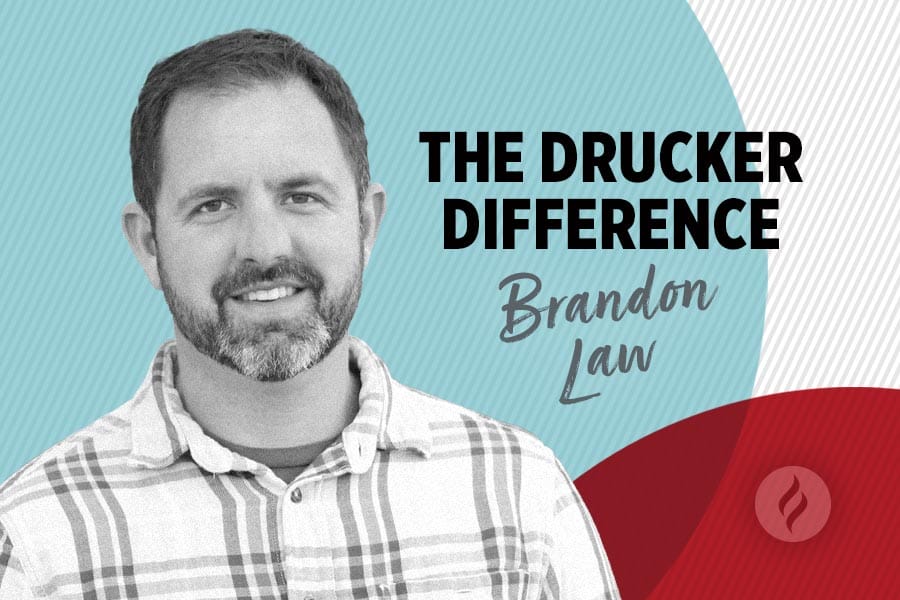The Drucker Difference: A New Era in Management

BY BRANDON LAW, MBA, 2010
“The greatest danger in times of turbulence is not the turbulence; it is to act with yesterday’s logic.”
– Peter Drucker
In March 2020, the workplace changed dramatically when everyone was suddenly forced to work from home. Now, nearly 3 years later, many aspects of work are back to normal, but the expectation employees have about remote work cannot be undone. Like it or not, most high-value knowledge workers now consider working from home a requirement, not just a once-a-week perk.
Even though there are some high-profile examples of organizations forcing employees back into the office (Musk comes to mind), these managers are fighting the inevitable tide of history. Millennials, Gen Z and other “kids these days” have a totally different expectations around what work should look like, and WFH is only the beginning. Today’s managers need to adapt quickly, or they’ll be forced out by a new cohort that isn’t afraid to throw off the traditions of the past to attract the best and brightest.
The Practice of Management 1980-2020
I’ve been a manager for 20 years now, and along the way I’ve leaned heavily on the wisdom of others to build my management toolkit. Which is to say that I’ve been deeply influenced by books like In Search of Excellence, The 7 Habits , Good to Great, One Minute Manager, and Emotional Intelligence, just to name a few.
Yet I wonder how many of these books, and the best practices they prescribe, still apply. How much, for example, are they contingent on co-located, in-person work?
Consider the breakroom, the offsite, the corner office, the water cooler, and coffee shop up the street. The conference room, the hallway, the open floor plan, the lobby, and everyone’s favorite happy hour spot. For many of us managers, these physical structures were the scaffolding that we relied on to get our job done, now they’re relics of a bygone era.
Do we really expect our tried-and-true techniques to still work after losing something as significant as shared physical experience? Is it reasonable to believe that the research we have on culture, motivation, and creativity applies when communication is limited to video calls?
“[In the future] Managers will have to learn how to manage in situations where they do not have command authority, where there are neither controlling or controlled.” – Peter Drucker, 2006
I think not. In fact, I know not. I’ve been managing a fully remote company as the CEO since 2012 and I can tell you for a fact that managing remote teams is substantially different than managing in-person ones. The principles are the same, but the tactics are very different.
A New Playbook
We’re in a new era of management, an era that started the year we all turned our cameras on for the first time. And given the magnitude of the change that we’ve experienced in such a short period of time, it’s no wonder that many organizations are still struggling to match the performance of the pre-pandemic period. The temptation to return to the past is a strong one, but it’s not the right path.
This is a once-in-a-generation opportunity to rethink the nature of work and create the types of organizations that will thrive in the future. Whether you’re a researcher, a teacher, a consultant, a writer, or a practicing manager like myself, this new era represents enormous opportunity to create the workplace of the future.
First Principles
Thinking in first principles would have us go “back to basics” by revisiting the fundamental insights that modern management practices were built upon in the first place. Then, after familiarizing ourselves with the core issues, we can reimagine the practice in the modern context.
For this type of fundamental insight, we need look no further than Peter Drucker. Drucker is the undisputed father of modern management and the principles he described in his early work illuminate many of the bedrock principles we’re looking for. After all, Peter started his consulting career in a time not unlike our own: As the world came out of WWII, managers were struggling to adapt the industrial age techniques of command-and-control to the new, modern, “knowledge worker” that was valued for more than just their labor.
Talking with managers at the time, Drucker emphasized the concept of planned abandonment, the idea that organizational leaders should ruthlessly and systematically eliminate outdated lines of business, obsolete products, and antiquated practices, including management techniques.
Here is the advice that Peter gave to these managers: “The first step in a growth policy is not to decide where and how to grow. It is to decide what to abandon. In order to grow, a business must have a systematic policy to get rid of the outgrown, the obsolete, [and] the unproductive.”
The idea of planned abandonment is well understood by academics, consultants, managers and executives; but what’s often overlooked is that planned abandonment applies to the practice of management itself. Maybe it’s because we don’t usually consider “the practice of management” as a thing like we do a product or service, but it is a thing, and we should recognize when it’s time to move on from outdated policies, processes, and traditions.
Brandon Law is the founder and CEO of Oasis, a fully remote technology company. Brandon started the company shortly after graduating from The Drucker School in 2010.
More from The Drucker Difference: